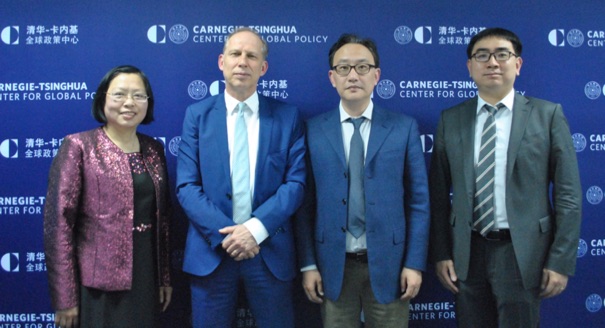Registration
You will receive an email confirming your registration.
A recent white paper by the European Commission sets out the main challenges and opportunities for Europe in the coming decade, and presents five scenarios for how the EU could respond to the impact of new technologies, doubts about globalization, and the rise of populism. The report comes ahead of consequential elections in France, Germany, and the Netherlands, the results of which will impact the future of European integration.
The Carnegie–Tsinghua Center’s Zhang Lihua moderated a discussion on the future of the EU with Jan van der Harst from the University of Groningen, Tian Dewen from the Chinese Academy of Social Sciences, and Wang Xiaoguan from the China University of Petroleum.
Discussion Highlights
- The Origins of the European Project: This year marks the 70th anniversary of the first step toward European integration—the Treaty of Rome. One panelist explained that the purpose at the time was to curb expressions of extreme nationalism by creating a supranational European project. This endeavor was aimed at balancing the various European powers to avoid the rise of a European hegemon and ensuring equal rights for members of European integration. The panelist added that the threat of economic protectionism meant that many European actors wished to create a level playing-field for companies to coexist in and to build a common European market.
- Seventy Years of Transformations: Enormous changes have taken place since the early days of European integration, one panelist argued. The collapse of the Soviet Union and the end of the Cold War in the 1990s meant the end of the European project’s united front against the main enemy in the East—the Soviet bloc and communism. The new generation of European leaders, who had not experienced the destruction of war and the urgency of peace that comes with it, brought about a new mentality, the discussant added. Instead of accepting the original European ideals straight away, this new political atmosphere was more critical of the slow progress that had been made and the heavy bureaucracies involved. Simultaneously, the United States has gradually supported European integration less and less, compared to the early years, the panelist said.
- Increasing European Complexity: Discussants agreed that the rise in doubt over the value and necessity of a European Union is due to its perceived complexity—both bureaucratic and ideological. The resilience of nation-states under the supranational establishment is fueled by the fact that European integration does not have a finality, one panelist argued. He added that this lack of a grand strategy means that often the way the European Union deals with issues is by pragmatically muddling through, instead of having a clear set of end goals. Furthermore, atlanticism—notably through the North Atlantic Treaty Organization—persists in certain countries and is strengthened by the EU’s welcoming attitude toward newcomers. These new complexities, panelists said, have led many political parties to reevaluate the role of the EU within the framework of domestic political aims.
- Why European Integration Remains Relevant: Despite the numerous complexities and the changing political climate within the EU, discussants agreed that the institution is still relevant today. The transnational nature of today’s security concerns—such as climate change, terrorism, and human migration—require a transnational effort that only the EU can adequately provide in the region, one panelist said. The external challenges recently posed by an expansionist Russia, one panelist observed, coupled with the unpredictability of the Trump presidency, have made European unity even more relevant. Moreover, together, the common market is more valuable than the sum of its parts, and abandoning it would not be beneficial to any single country, the panelist concluded.
- The Future of European Integration: One panelist argued that Brexit is not the end of the EU. Rather, the EU should pursue a policy of “multi-speed Europe”, by letting countries develop at their own pace rather than imposing a one-size-fits-all solution on all members. This policy, the discussant said, would increase the efficiency of decisionmaking within the EU. Current debates among and within member states about the refugee crisis and populist movements in Europe are valuable opportunities, the panelist added, to rethink the idea of Europe and to innovate. Discussants concluded that the EU remains a valuable tool both politically and economically and can overcome the current crises should it succeed in reforming itself in an innovative way.
Zhang Lihua
Zhang Lihua is a resident scholar at the Carnegie–Tsinghua Center for Global Policy where her program at the center examines how China's One Belt One Road initiative affects Europe.
Jan van der Harst
Jan van der Harst is professor of European Integration and head of the Department of International Relations at the University of Gronigen.
Tian Dewen
Tian Dewen is the director of the Department of European Social and Cultural Studies at the Chinese Academy of Social Science's Institute of European Studies.
Wang Xiaoguang
Wang Xiaoguang is a research associate at the Academy of Chinese Energy Strategy at the China University of Petroleum.
